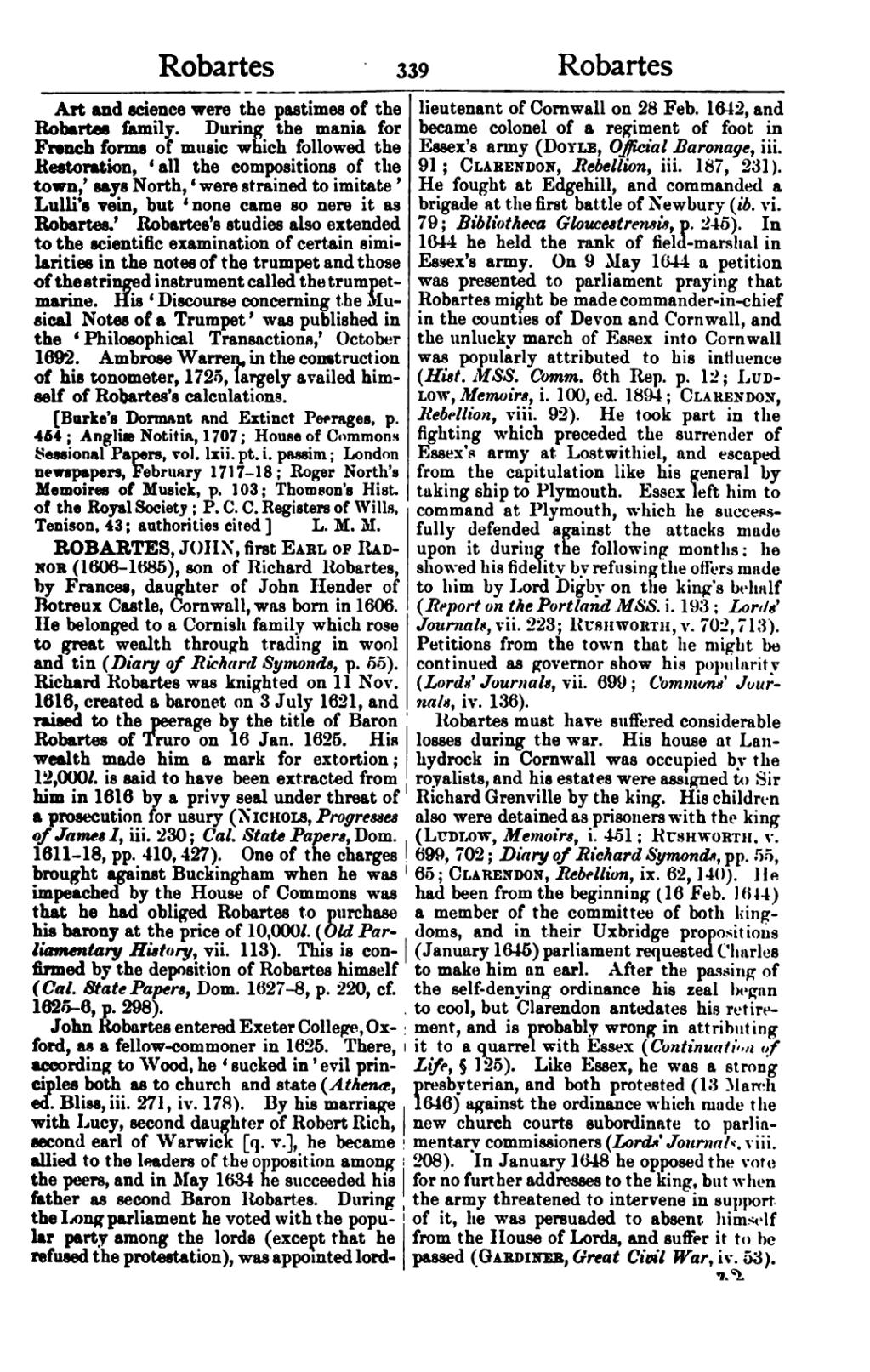Art and science were the pastimes of the Robartes family. During the mania for French forms of music which followed the Restoration, ‘all the compositions of the town,’ says North, ‘were strained to imitate’ Lulli's vein, but ‘none came so nere it as Robartes.’ Robartes's studies also extended to the scientific examination of certain similarities in the notes of the trumpet and those of the stringed instrument called the trumpet-marine. His ‘Discourse concerning the Musical Notes of a Trumpet’ was published in the ‘Philosophical Transactions,’ October 1692. Ambrose Warren, in the construction of his tonometer, 1725, largely availed himself of Robartes's calculations.
[Burke's Dormant and Extinct Peerages, p. 454; Angliæ Notitia, 1707; House of Commons Sessional Papers, vol. lxii. pt. i. passim; London newspapers, February 1717–18; Roger North's Memoires of Musick, p. 103; Thomson's Hist. of the Royal Society; P. C. C. Registers of Wills, Tenison, 43; authorities cited.]
ROBARTES, JOHN, first Earl of Radnor (1606–1685), son of Richard Robartes, by Frances, daughter of John Hender of Botreux Castle, Cornwall, was born in 1606. He belonged to a Cornish family which rose to great wealth through trading in wool and tin (Diary of Richard Symonds, p. 55). Richard Robartes was knighted on 11 Nov. 1616, created a baronet on 3 July 1621, and raised to the peerage by the title of Baron Robartes of Truro on 16 Jan. 1625. His wealth made him a mark for extortion; 12,000l. is said to have been extracted from him in 1616 by a privy seal under threat of a prosecution for usury (Nichols, Progresses of James I, iii. 230; Cal. State Papers, Dom. 1611–18, pp. 410, 427). One of the charges brought against Buckingham when he was impeached by the House of Commons was that he had obliged Robartes to purchase his barony at the price of 10,000l. Old Parliamentary History, vii. 113). This is confirmed by the deposition of Robartes himself (Cal. State Papers, Dom. 1627–8, p. 220, cf. 1625–6, p. 298).
John Robartes entered Exeter College, Oxford, as a fellow-commoner in 1625. There, according to Wood, he ‘sucked in’ evil principles both as to church and state (Athenæ, ed. Bliss, iii. 271, iv. 178). By his marriage with Lucy, second daughter of Robert Rich, second earl of Warwick [q. v.], he became allied to the leaders of the opposition among the peers, and in May 1634 he succeeded his father as second Baron Robartes. During the Long parliament he voted with the popular party among the lords (except that he refused the protestation), was appointed lord-lieutenant of Cornwall on 28 Feb. 1642, and became colonel of a regiment of foot in Essex's army (Doyle, Official Baronage, iii. 91; Clarendon, Rebellion, iii. 187, 231). He fought at Edgehill, and commanded a brigade at the first battle of Newbury (ib. vi. 79; Bibliotheca Gloucestrensis, p. 245). In 1644 he held the rank of field-marshal in Essex's army. On 9 May 1644 a petition was presented to parliament praying that Robartes might be made commander-in-chief in the counties of Devon and Cornwall, and the unlucky march of Essex into Cornwall was popularly attributed to his influence (Hist. MSS. Comm. 6th Rep. p. 12; Ludlow, Memoirs, i. 100, ed. 1894; Clarendon, Rebellion, viii. 92). He took part in the fighting which preceded the surrender of Essex's army at Lostwithiel, and escaped from the capitulation like his general by taking ship to Plymouth. Essex left him to command at Plymouth, which he successfully defended against the attacks made upon it during the following months; he showed his fidelity by refusing the offers made to him by Lord Digby on the king's behalf (Report on the Portland MSS. i. 193; Lords' Journals, vii. 223; Rushworth, v. 702, 713). Petitions from the town that he might be continued as governor show his popularity (Lords' Journals, vii. 699; Commons' Journals, iv. 136).
Robartes must have suffered considerable losses during the war. His house at Lanhydrock in Cornwall was occupied by the royalists, and his estates were assigned to Sir Richard Grenville by the king. His children also were detained as prisoners with the king (Ludlow, Memoirs, i. 451; Rushworth, v. 699, 702; Diary of Richard Symonds, pp. 55, 65; Clarendon, Rebellion, ix. 62, 140). He had been from the beginning (16 Feb. 1644) a member of the committee of both kingdoms, and in their Uxbridge propositions (January 1645) parliament requested Charles to make him an earl. After the passing of the self-denying ordinance his zeal began to cool, but Clarendon antedates his retirement, and is probably wrong in attributing it to a quarrel with Essex (Continuation of Life, § 125). Like Essex, he was a strong presbyterian, and both protested (13 March 1646) against the ordinance which made the new church courts subordinate to parliamentary commissioners (Lords' Journals, viii. 208). In January 1648 he opposed the vote for no further addresses to the king, but when the army threatened to intervene in support of it, he was persuaded to absent himself from the House of Lords, and suffer it to be passed (Gardiner, Great Civil War, iv. 53).
